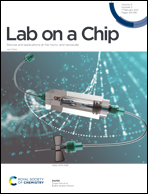HiPSC-derived multi-organoids-on-chip system for safety assessment of antidepressant drugs†
Abstract
The poor predictive power of existing preclinical models has spurred efforts to develop human-relevant models for accurate assessment of drug safety. In this work, we developed a multi-organoids-on-a-chip system derived from human induced pluripotent stem cells (hiPSCs), which allows for the assessment of the cardiac safety of an antidepressant drug, following liver metabolism in vitro. This liver-heart organoids-on-chip device contains compartmentalized chambers separated by a porous membrane, which permits the co-culture of 3D human liver organoids in the upper multi-well chamber and cardiac organoids in the bottom micropillar array simultaneously. The co-cultured liver and heart organoids on chip maintained good viability and human organ-specific functions respectively, including the synthesis of albumin and urea of liver organoids, and the beating function of cardiac organoids. In particular, the liver organoids displayed proper metabolic capabilities with high expression of CYP450 enzyme genes. Clomipramine, a widely used antidepressant drug, can be metabolized into an active metabolite (desmethylclomipramine) through the hepatic CYP450 enzymes of liver organoids on chip identified by mass spectrometry. After exposure to 1 μM clomipramine in the liver chamber for 24 h and 48 h, the co-cultured heart organoids in the bottom layer showed significantly reduced cell viability, impaired functions of cardiac beating and calcium flux, indicating the hepatic metabolism-dependent cardiotoxicity induced by clomipramine. By combining stem cell biology and microengineered technology, this proposed hiPSC-derived multi-organoids-on-a-chip system can reflect human organ-specific functions, as well as the complex process of drug metabolism and responses at the multi-organ level. It may provide a novel platform for the assessment of drug effectiveness and safety in vitro.



 Please wait while we load your content...
Please wait while we load your content...